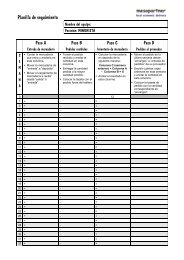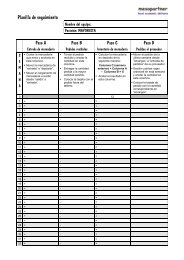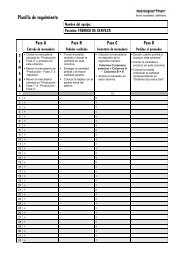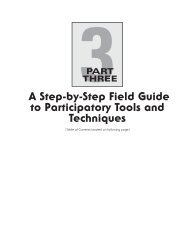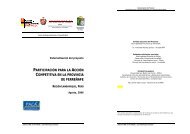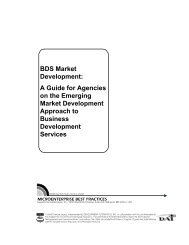McCormick+Schmitz Handbook for value chain research on - PACA
McCormick+Schmitz Handbook for value chain research on - PACA
McCormick+Schmitz Handbook for value chain research on - PACA
You also want an ePaper? Increase the reach of your titles
YUMPU automatically turns print PDFs into web optimized ePapers that Google loves.
individuals can also be ordinary people. A woman who remembers when the factories<br />
first began putting out work can be an invaluable resource. Key in<str<strong>on</strong>g>for</str<strong>on</strong>g>mants are often<br />
identified in a sequential process, beginning with the obvious official types and<br />
c<strong>on</strong>tinuing by asking each interviewee who might provide additi<strong>on</strong>al in<str<strong>on</strong>g>for</str<strong>on</strong>g>mati<strong>on</strong>.<br />
Formal in<str<strong>on</strong>g>for</str<strong>on</strong>g>mant interviewing requires c<strong>on</strong>siderable preparati<strong>on</strong>. It takes reading and<br />
thought to decide what questi<strong>on</strong>s to ask. The trick is to get the in<str<strong>on</strong>g>for</str<strong>on</strong>g>mati<strong>on</strong> you need<br />
without wasting in<str<strong>on</strong>g>for</str<strong>on</strong>g>mants’ time by asking <str<strong>on</strong>g>for</str<strong>on</strong>g> things that you might just as easily obtain<br />
elsewhere. Work out carefully what you want to ask, and in approximately what order.<br />
The in<str<strong>on</strong>g>for</str<strong>on</strong>g>mant may shift from <strong>on</strong>e topic to another so that the list is not covered in the<br />
order planned, but topics can be ticked off as they are discussed so that all are covered.<br />
Try to put in<str<strong>on</strong>g>for</str<strong>on</strong>g>mants at ease and encourage full discussi<strong>on</strong> of each topic. Encourage<br />
precisi<strong>on</strong> and specific examples where answers are vague or rhetorical. As a general<br />
principle, let the in<str<strong>on</strong>g>for</str<strong>on</strong>g>mant carry the discussi<strong>on</strong>. Say as little as possible yourself; you<br />
have come to listen. Your opini<strong>on</strong>s, if injected too so<strong>on</strong>, could bias the in<str<strong>on</strong>g>for</str<strong>on</strong>g>mant’s<br />
resp<strong>on</strong>ses. An interview should not last too l<strong>on</strong>g. A carefully planned interview can<br />
usually be carried out in 30-60 minutes; <strong>on</strong>ly in excepti<strong>on</strong>al circumstances would a single<br />
interview go bey<strong>on</strong>d two hours.<br />
Listen critically. The material supplied by in<str<strong>on</strong>g>for</str<strong>on</strong>g>mants is not always fully reliable. Piel<br />
(1995) suggests a series of questi<strong>on</strong>s to ask yourself:<br />
1. How does the in<str<strong>on</strong>g>for</str<strong>on</strong>g>mant know this - from pers<strong>on</strong>al experience, a report, or merely<br />
opini<strong>on</strong>?<br />
2. To what extent is the report affected by the in<str<strong>on</strong>g>for</str<strong>on</strong>g>mant’s positi<strong>on</strong> in the community,<br />
pers<strong>on</strong>ality, etc.?<br />
3. Does this account serve his/her pers<strong>on</strong>al prejudices or commitments? Is this what<br />
should have happened rather than what did happen?<br />
4. What evidence do I have that this pers<strong>on</strong> is usually accurate? Is the report internally<br />
c<strong>on</strong>sistent? Does it agree with what others have said?<br />
Sometimes you can test the <str<strong>on</strong>g>value</str<strong>on</strong>g> of what the in<str<strong>on</strong>g>for</str<strong>on</strong>g>mant is saying during the course of the<br />
interview by asking probing questi<strong>on</strong>s. When you feel that to do this would be<br />
inappropriate or would break the relati<strong>on</strong>ship you are trying to establish with the<br />
in<str<strong>on</strong>g>for</str<strong>on</strong>g>mant, you might just note your questi<strong>on</strong>s and hesitati<strong>on</strong>s <str<strong>on</strong>g>for</str<strong>on</strong>g> future reference.<br />
108





